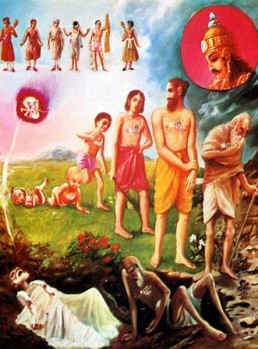Swami Chinmayananda
Swami Chinmayananda Commentary
After explaining that a Perfect-One is: (a) ever satisfied in the Self, (b) that he lives in perfect equanimity in pleasure and pain, and (c) that there is, in him, a complete absence of attachment to rejoicing or any aversion, it is here mentioned that a Man-of-Steady-Wisdom has the special knack of withdrawing his senses from all the disturbing ‘fields of objects.’ The simile used here is very appropriate. Just as a tortoise can, even at the most distant suggestions of danger, instinctively withdraw all its limbs into itself, and feel safe within, a man-of-Perfection can consciously withdraw all his antennae that peep out through his five arches-of-knowledge, called the sense-organs.
In the theory of perception in Vedanta, the mind, bearing the consciousness, goes out through the sense-organs to the sense-objects, and, there it takes, as it were, the shape of the sense-objects, and so comes to gain the “knowledge” of the objects perceived. This idea is figuratively put in the Upanishad — the Light of Consciousness, as it were, beams out through the seven holes in the cranium, each special ‘beam’ of awareness illuminating only one specific type of ‘object.’ Thus, the ‘Light’ that passes through the eyes is capable of illumining only the FORMS and COLOURS, while that which emerges through the ears illumines SOUNDS. In the material world, we can take the example of the electric-light that expresses through an ordinary bulb illuminating the objects in the room, while the electricity, as light, emerging from the X-ray tube penetrates through the form and illumines things that are ordinarily not visible to the naked eye.
Thus, in each individual, five distinct beams of the same Awareness protrude like antennae and give him complete “knowledge” of the eternal world. These five avenues-of-knowledge bring to him the innumerable stimuli from the outer world, which, reaching the mind, provide all the disturbances that man feels in his life of contacts with the outer world. If I am blind, the beauty that is passing by cannot disturb my mind; if I am deaf, I cannot over-hear criticism against myself, and naturally, it cannot reach me to agitate my bosom! The untasted or the unsmelt or the unfelt sense-objects can never bring any pang of sorrow into the bosom. Here Krishna re-assures Arjuna that a Man-of-Steady-Wisdom is he, who has the ready capacity to fold back his senses, from any or all the fields of their activity.
This capacity in an individual to withdraw his senses at will from the fields-of-objects is called in Yoga Shastra as Pratyahara, which the Yogin accomplishes through the control-of-breath (Pranayama). To a devotee this comes naturally, because he has eyes and ears only for the form and stories of his beloved Lord. To a Vedantin, again, this (Uparati) comes from his well-developed and sharpened discriminative faculty, with which his intellect makes his mind understand the futility, of licking the crumbs of joy and happiness in the wayside ditches of sensuousness, while he, in his Real Nature, is the Lord of the very store of Bliss Infinite.
THE SENSES OF A MAN WHO IS ILL, AND CONSEQUENTLY NOT ABLE TO PARTAKE OF THE SENSUOUS OBJECTS, ARE SEEMINGLY UNDER CONTROL, BUT THE TASTE FOR THEM DOES NOT THEREBY CEASE TO EXIST. HOW DOES EVEN THE TASTE FOR SENSE-OBJECTS FINALLY END? LISTEN:
Adi Sankara Commentary
And besides, yada, when; ayam, this one, the sannyasin practising steadfastness in Knowledge; samharate, fully withdraws; [‘Fully’ suggests absolute firmness in withdrawal, and ‘withdraws’ suggests full control over the organs] indriyani, the senses; indriya-arthebhyah, from all the objects of the senses; iva, as; kurmah, a tortoise; sarvasah, wholly (withdraws); angani, its limbs, from all sides out of fear; — when the man engaged in steadfastness to Knowledge withdraws thus, then tasya, his; prajna, wisdom; pratisthita, remains established — (the meaning of this portion has already been explained). As to that, [That is , so far as the phenomenal world is concerned.] the organs of a sick person, too, cease to be active when the refrains from sense-objects; they get fully withdrawn like the limbs of a tortoise. but not so the hankering for those objects. How that (hankering) gets completely withdrawn is being stated:
The Bhagavad Gita with the commentary of Sri Sankaracharya – Translated by Alladi Mahadeva Sastry
Holy Geeta – Commentary by Swami Chinmayananda
The Bhagavad Gita by Eknath Easwaran – Best selling translation of the Bhagavad Gita
The Bhagavad Gita – Translation and Commentary by Swami Sivananda
Bhagavad Gita – Translation and Commentary by Bhaktivedanta Swami Prabupadha
Srimad Bhagavad Gita Chapter 2 – Verse 58 – 2.58 yada sanharate – All Bhagavad Gita (Geeta) Verses in Sanskrit, English, Transliteration, Word Meaning, Translation, Audio, Shankara Bhashya, Adi Sankaracharya Commentary and Links to Videos by Swami Chinmayananda and others – 2-58

